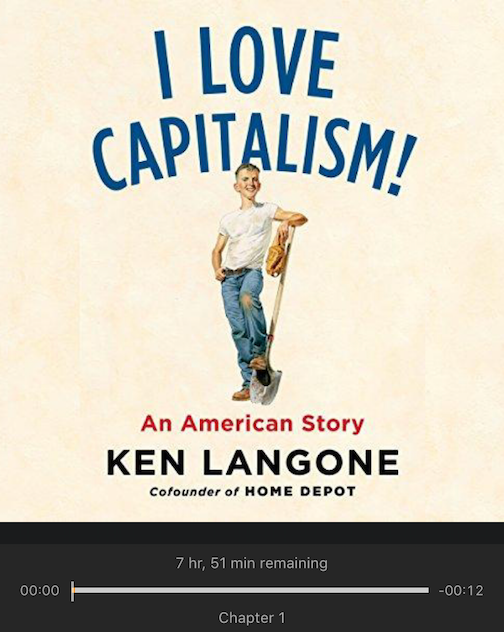I Love Capitalism! by Ken Langone

Ken Langone was highlighted at Palm Beach Atlantic University’s American Free Enterprise Day a few years back and I loved the story that he shared. When I saw that he had a biography released on Audible, I knew that I would enjoy learning more from him and his life. While the book was certainly impactful, I did not know much about his path to becoming the CEO of Home Depot. The things that he did were incredible. He is someone that I have a deep respect for now.
The first thing that stood out to me from the book was the way that he generated money while at Bucknell University. He was someone who had an eye for business early on in life and knew how to create opportunities. Ken did a fantastic job of identifying a potential opportunity in his life and then created a solution for the gap.
At Bucknell, he was contemplating how to make some money and realized freshman orientation would be a great time to target people. He contacted a stationary company and went with samples to people’s dorms. He said, “You have 10 friends you’ll write to? Maybe two or three times a week? Okay, here’s what you’ll need for the whole year but I’ll give you a nice price break it you get it all today.” He made sure to get all the money right away because after 2 weeks they had forgotten about their friends and writing letters was the last thing on their mind. He had people tell him years later that they still had boxes of that stationary. He realized,
“Suddenly supply and demand was more than just a theory to me.”
There always seems to be that one impactful moment or impression from a certain individual for everyone who I would say is “ultra-succesful” and these people never forget that person. As a result of the individual’s kindness, Ken continues to give and give and give to Bucknell.
He got married to his wife in the beginning of 1956, his senior year at Bucknell. Before they got married, she was going to go to nursing school. Once they got married, she never went to nursing school. His dad was very adamant that you shouldn’t get married unless you can support your wife. Ken knew he just needed to make money. They both barely had enough money to last from September to January. That meant he needed to finish two semesters in one so he went to the dean of students to get permission to take extra classes. He then realized home miscalculated and was going to be $300 short by the end of January due to the cost of the extra classes. And thanks to the secretary to the dean, Martha Henderson. He says he still feels indebted to the school even though he’s paid it back years ago and is glad he does. He says that was the key to the door that allowed him to go beyond that point.
I found this interesting at first but upon further reflection, it makes sense. I’m privately very reserved but my public person is one that is very assertive. This does not mean that I’m inauthentic or wishy washy, just that my home environment is much more disciplined so there is no real reason to be assertive — I’m 100% in control, as I usually am.

The first big lesson Ken learned from Bendy, someone who took Ken under his wing at the firm, was one Bendy taught by example. Ken learned that a man’s public persona usually has very little to do with his private persona.
WOW. I made a note that I should find more information about this. I wanted to know exactly what he did and exactly what the results of this IPO were. This is absolutely incredible. The IPO was for Electronic Data Systems in 1968.
Ken did his first IPO at 115x earnings when everyone else was only doing 30–40x earnings.
I tell myself the same thing often. I have a vision of what the future might look like and at a minimum, an idea of what some things might look like — I need to play my part. I know that God is calling me to develop control or a system for certain things and it’s essential that I take that seriously. I loved what Bernie was told. And the biggest thing was that he ACTED.
Bernie was the CEO of a successful company in California and Ken became good friends with him after they worked together. There was a company called FedMart. They eventually were sold to a German company. Then those founders created Price Club, similar to Costco today where they charged membership fees to supplement their profit. They would buy in bulk and sell at very low profit margins while being very well organized stores. One day in the 1970s, Price invited Bernie to look at the Price Club operate. He told him, “You see this store Bernie? Someday someone is going to do this with home improvement and whoever does it is going to change the face of the industry dramatically. If somebody isn’t you, you’re going to be in trouble.” Bernie never forgot that.
In hindsight, of course, is this really a revolutionary idea? At the time, yes, it was not being done by anyone. The thing that jumped out to me was the lower profit margin. The industry average was going to be more than 30% higher than what the original idea entailed. Wow.
Bernie’s revolutionary idea for home improvement stores sounded great on paper. The idea was a 55,00–70.000 square foot building with high ceilings and steep discounts made possible because they’d buy directly from manufacturers. The proposal anticipated $7–9 million annually per store. They predicted gross profit margins of 29–31% while the industry standard was 42–47%. The shared sales volume would compensate for the lower margin.
12 months. Ken had done this before, or at least seen it before. He knew what it took to launch a business and he was adamant that even though the idea was excellent and the model was credible and one that could be very fruitful, he spent a LOT of time on research. Due diligence. Do your due diligence. Always always always, that’s what stands out to me about Ken.

Ken believed in it wholeheartedly and needed a couple million dollars of venture capital for the initial stages and anticipated 12 months to understand the market and identify the best location for the first store. While the economy wasn’t great, he needed a contrarian with a couple million dollars laying around. Ken wrote, “who else but Ross Perot?”
Boom. They created the strategy, God provided the opportunity and they took the “step into the river” so that God could part the Jordan and allow them to walk through the river without getting wet. God provided the perfect opportunity for them.
Bernie discovered a company who was doing virtually the same thing that Bernie had thought of. Upon going into the store it was easy for them to notice that the owner was really in a lot of trouble. Everything was extremely disorganized. They recognized that they found the ideal marketing genius though, and they had their team.
Amen. Creatively rather than reactively. Say it again, read it again, wow is this ever true.
What Ken learned most from getting Home Depot off the ground and finding funding was that we need to think creatively instead of just reactively when the chips are stacked against us.
Wow. He was assertive and honest and shared his concerns so that the relationship could be best reflected accordingly. Ken never shared of a time where he did something for short-term benefit and disregardedthe long-term impact. I found that incredible. In the following situation, he spent time considering the opportunity and then did due diligence before committing.
Ken got his MBA at NYU. He was approached to become the chairman of the NYU medical center in 1999. He was very straightforward with the current chairman who had too much on his plate and told him, “this is a Jewish town and I don’t need any suspicion that I pushed a Jew out of this position.” Ken then decided to give $100 million to the medical program and also to take the job.
Agreed. If someone asks you, “Can you do this?” and you maybe don’t know exactly how you’d do that, commit first — figure the rest out later. That’s being honest, just say, “I’ll get it done,” and hten actually EXECUTE. It’s not important if we don’t know exactly how to do the cretain thing when we are asked to do it, it matters that we are resourceful and get. It. Done.
“Some people are too honest for their own good. That doesn’t mean you should lie just that you shouldn’t undercut your own case.” — Ken Langone
I love this story and love the positive influence that their gift had when it was made publicly and more people were able to give to the medical center eas a result of the Langone name and reputation being attached to it.
Ken and Elaine donated $100 million to NYU’s medical center in 1999 and stipulated that the gift be anonymous. When they made the same gift three years later they made the same stipulation. This time however other people NYU came to them and said that if they were willing to attach their names to the gift, then other people would be more willing to come forward with major gifts and they were right of course. Ken thought nothing could top the success of Home Depot in his business life but the success of the NYU medical center means much more, as much as he loves Home Depot. He took the NYU job at 65 years old and was very grateful to help bring new life to an institution that has helped tens of thousands of people.

Love this love this and love this again. I believe that it is essential to understand the company at all levels and in all areas. This is something I strive to hold close to hear at all times.
Frank Blake became the CEO and spent time in every store. He proved that the big picture truly depends on a lot of smaller pictures.
This is a great philosophy and one that I believe is valuable to remember always as we strive to grow and experience continued success.
Every time Ken played poker and counted his winnings during the game, he lost. He shares that mindset with all his wealth and says he isn’t counting until he leaves the table and he isn’t leaving the table until he has to.
This again, is something that I believe deeply. It does not matter what we attain or are given if we never do any good with it.
“My net worth is what good I do with what I have.” — Ken Langone
So so so so important. I think back to the old saying, “If you want to go fast, go alone. If you want to go far, go together.” We NEED others.
“I’d rather own 10% of a $1 billion company than 100% of a $100 million company. The numbers are exactly the same but by owning a piece of the billion dollar company, I get the benefit of everyone pulling with me and that’s a big benefit.” — Ken Langone
This is such a great Biblical principle that Ken practiced.
“One of the most important lessons of my life is this: leave more on the table for the other guy than he thinks he should get. One of the most important rules in capitalism is incentive.” — Ken Langone
Amen. I believe in this deeply and strive to practice the same thing. The goal is never to have wealth concentrated but is rather to uplift many and better the world for all.
Ken shared that they have over 3,000 people at Home Depot who started off we hourly associates and are multimillionaires today. When capitalism works the way it should, it works for everyone. It’s like the tide, all boats get lifted.
True that. This is what it takes and requires to become successful in the way that many dream. We must remain creative and resilient and do all that we can to make lemonade out of the lemons that we have been provided. While we cannot control everything, the most successful people always control what they can and become all that they can.

“What distinguishes the winners from the losers us the ability to turn adversity around, resilience, and creativity.” — Ken Langone
Wow I dream about this. I see myself doing the same at 72, 82, and 92! I know that I’ve been blessed with a work ethic and personality that is unique and rare — I strive to take full advantage of all that I can.
At 82, Ken says he is still excited to get out of bed each morning and still charged up about what the next deal might bring. Though what the money and enthusiasm have brought him have enabled him to live well and help others, he can honestly say that if it came down to it, he would pay to go to work every day. He ends with, “How many people can say that?”

This book was fantastic. The way that Ken made decisions was exemplary and I loved the honor that he always gave to God and His will for our lives. I believe that we are called to do incredible things with what we are given and created with. I always enjoy learning about people’s successes and Ken certainly has had a ton of them throughout his life. Some of the things that he shared throughout the book are things that I really agree with and strive to put into practice.
I gave this book a 4/5